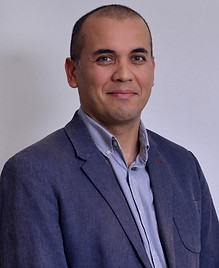

Society for
Global Nineteenth-Century Studies
Executive Council
Kevin A. Morrison
President
Editor, Global Nineteenth-Century Studies
Co-editor, Studies in the Global Nineteenth Century
Henan University
China
Research areas: Nineteenth-century political cultures; circulations, transfers, and migrations between Britain and the wider world; East India Company; the global dissemination of nineteenth-century popular literature; transnational life writing.
Radha Dalal
Vice President
Virginia Commonwealth University School of the Arts in Qatar
Qatar
Research areas: Islamic art and architecture; nineteenth and early twentieth-century visual culture of the Middle East and South Asia; urbanism and mobility studies; collective memory and cultural heritage studies; history of photography; history of museums
Andrés Baeza Ruz
Universidad Adolfo Ibáñez
Chile
Research areas: British informal imperialism in Latin America; circulation and transfer of educational ideas and practices in nineteenth-century Latin America;
nation-building in Latin America from global and transnational perspectives;
origins of civil society in Latin America

Manal Hosny
Gulf University for Science and Technology
Kuwait
Research areas: Nineteenth century French literature; children literature and school textbooks in late nineteenth century France; ideology and education in late nineteenth century France; nation and nationalism in nineteenth century France; French imperialism in the Middle East; French cultural influence in Egypt; nineteenth and twentieth century Francophone literature in the Middle East.

Chris Holdridge
North-West University
South Africa
Research areas: History of the British Empire; settler colonialism in nineteenth-century South Africa and Australia; popular politics; the colonial press; penal colonies; carceral studies; international legal history; The South African War, 1899-1902.
Committees
Program Committee: 2026 International Symposium
Co-Chair: Charlotte Legg, University of London Institute in Paris
Co-Chair: Kevin A. Morrison, Henan University, China
Program Committee: 2025 International Symposium
Chair and convenor: Kevin A. Morrison, Henan University, China
Manal Hosny, Gulf University for Science and Technology, Kuwait
Alessandro De Cola, Università di Bologna, Italy
Charlotte Legg, University of London Institute in Paris, France
Chong Xu, Soochow University, China
Cherrie Kwok, University of Virginia, USA
Awards Committee
Chair: Winter Jade Winter, Wheaton College
Membership Committee
Chair: Karen Oslund, Towson University, USA
Preeshita Biswas, Texas Christian University, USA
Alessandro De Cola, Università di Bologna, Italy
Rodrigo Escribano Roca, Universidad Adolfo Ibáñez, Chile
Ad Hoc Committee on Research Groups
Chair: Chong XU, Soochow University, China
Irina Kantarbaeva BILL, University of Toulouse, France
Catalina Veronica FARA, Universidad Nacional de San Martín, Argentina
Mo SAKHNINI, Khalifa University, United Arab Emirates
Aleksandar ZLATANOV, Bulgarian Academy of Sciences, Bulgaria
Organizing Committee: 2025 World Congress
Berny Sèbe, Co-chair, University of Birmingham
Kevin A. Morrison, Co-chair, Henan University
Nathan Cardon, University of Birmingham
Eleanor Dobson, University of Birmingham
Maddie Hewitson, University of Birmingham
Kate Nichols, University of Birmingham
Emma Tyler, University of Birmingham
Xinbei Wang, University of Birmingham
Tomoki Yamada, University of Birmingham
Core Values
-
Honesty and fairness
-
Mutual trust and respect
-
High standards of ethics and integrity
-
Diversity and inclusiveness
-
Interdisciplinarity and multidisciplinarity
-
Freedom of inquiry and dissemination of findings
Aims and objectives
-
Promoting excellence in teaching, research and professional endeavors related to global nineteenth century
-
Promoting mentorship and transnational collaborative partnerships
-
Building capacity, connections, and dialogue
-
Promoting innovation and critical thinking
-
Promoting SGNCS’s relevance in bringing together the breadth and variety of scholarly activities related to global nineteenth century
-
Promoting SGNCS’s growth and sustainability
-
Recognizing outstanding work in the discipline
Statement of diversity
The strength of SGNCS is derived from the diversity of our membership and it is our policy to reject all forms of prejudices and discrimination and ensure that SGNCS fosters diversity in the field for global nineteenth-century studies, including but not limited to representation by people of color, Indigenous people, persons of all sexual orientations and gender identities, gender expressions, veteran status, persons with disabilities, persons from all types of educational institutions, backgrounds, and different employment positions. The SGNCS is respectful of all languages including those reflected in our membership and transnational networks across several continents, as well as inclusive of scholars and independent thinkers from a wide range of geographic regions and disciplinary perspectives.
Statement of anti-harassment
The SGNCS is committed to creating and maintaining a safe and inclusive environment for all participants in all of its activities, in all venues, and social settings free from all forms of harassment or intimidation based on an individual’s sex, race, age, ethnicity, national origin, religion, language, sexual orientation, gender identity or gender expression, disability, health conditions, socioeconomic status, marital status, domestic status, or parental status. It should be clearly understood that harassment, whether explicit or implicit, verbal or physical, will not be tolerated by SGNCS. All members and non-members, including employees, contractors, vendors, volunteers and guests, are expected to abide by this policy and engage in respectful and professional behavior in all communications and at biennial congresses, workshops, official and unofficial SGNCS gatherings.
Constitution and by-laws
Until relatively recently, historians as well as contextually oriented scholars in art history, musicology, literary studies, and related fields utilized the nation-state or regions as their key frameworks of analysis. Since the early 1990s, however, new approaches to studying phenomena that transcend nation-states and culturally bounded areas have emerged. Although transnational, global, and international history and related approaches such as transimperialism, transatlanticism, and transpacificism all differ in their methodologies and assumptions, they share the common goals of thinking outside national paradigms and beyond Western perspectives. The Society for Global Nineteenth Century Studies serves as a gathering place for scholars hailing from a variety of disciplines who take phenomena of global significance as their principal concern. The draft constitution and by-laws will be ratified at our first World Congress in 2023.
Constitution
By-laws






